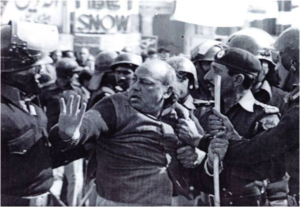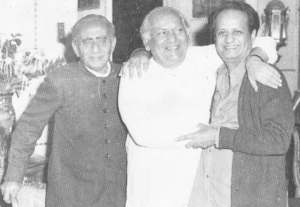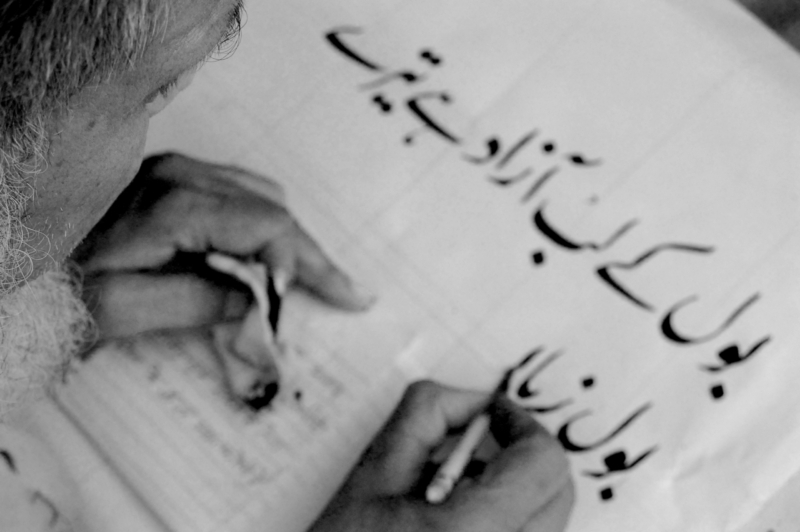My piece published in the Friday Times last week
For decades, Pakistan’s poets and writers have defied conventions and the almighty establishment. Rooted in the progressive writers’ movement, the literature of resistance was a pro-people ideology that kept redistribution of power and resources at its core. The great poet Faiz Ahmad Faiz was often jailed and kept on the margins of the literary and cultural establishment and castigated as a “foreign agent” and “anti-Pakistan.” Scores of other writers had to suffer torture and silencing by the state when they challenged its arbitrariness. Habib Jalib faced similar treatment and died a poor man after decades of acting as the poetic conscience of a nation.
It was the lyrical, direct poetry of Habib Jalib that stirred the street for decades, echoing the vision of the world from below. Jalib’s expression was popular and immediate, and could be related to easily by the average listener. During the rule of General Ayub Khan, from 1958 until 1969, Jalib particularly represented the public conscience when he chanted his poem Dastoor (Constitution), which was about Ayub Khan’s tailor-made “constitution.” Later, this work was utilised in support of Fatima Jinnah’s (the Quaid-e-Azam’s younger sister’s) campaign against the general:
Aisay dastoor ko,
Subh-e-baynoor ko,
Mein naheen manta,
Mein naheen janta
(I do not accept/I do not recognise/A constitution that resembles/A morning with no light).
In 2008, we saw the Punjab Chief Minister chanting these lines. The poetry has come full circle. While the Chief Minister’s rendition surely astounded his brother, it also stunned the public. Was it the espousal of the progressive cause or the appropriation of the idiom? Only time will tell.

They say that the world has changed. Nothing is therefore more surprising than the appropriation of progressive values and idioms by corporate interests in a globalising Pakistan. I was therefore stunned to hear a major telecom company’s advertisement using Faiz’s powerful poem Bol as a jingle to sell its particular product. Not only does this denude the magic of the poetry but it also robs the poetry of its larger social and political message in a country where freedom of expression remains stifled, the loud and screaming private TV channels notwithstanding. The poem’s message is reflected in these lines:
Speak, for your lips are yet free,
Speak, for your tongue is still your own,
Your lissom body yours alone,
Speak, your life is still your own
And the conclusion is clear: this poem is not about the act of speaking but speaking the truth and being undaunted by the falsities that pervade a polity such as Pakistan:
Speak, the truth is still alive,
Speak: say what you have to say

Opposition to the military regime was marked by a liberal ethos, a value-system that stressed constitutionalism, rule of law, and the independence of judiciary, rather than identifying with the politics of redistribution or attacking Pakistan’s problem uno supremo: poverty
Admittedly, the 2007 civic movements for the independence of the judiciary and against the rule of General Musharraf were spectacular in the sense that they revived political activism after inertia of nearly a decade. However, at best this activism remained at the margins of “change” or broader issues of social justice. For one thing, the opposition to the military regime was marked by a liberal ethos, a value system that stressed constitutionalism, rule of law, and the independence of judiciary, rather than identifying with the politics of redistribution or attacking Pakistan’s problem uno supremo : poverty.
When confronted with questions about how the challenges faced by Pakistan were to be addressed through a powerful and independent Chief Justice, fallacious arguments were woven and presented on TV screens, placards and the internet. The flawed logic was as follows: we control inflation as the Chief Justice will take suo motto notice of rising price levels. Or, the war on terror will be stopped by the miraculous recovery of the missing persons, many of whom had been rightly or wrongly identified with the Al-Qaeda networks.
Most forgot that the institution of the judiciary is innately conservative and has actively reversed the piecemeal land reform efforts of the 1970s, the most famous case being the return of thousands of acres to the former President Farooq Leghari by a High Court Bench and numerous judgements that found redistribution of land un-Islamic and absentee landlordism not averse to the clergy-defined features of an Islamic economy.
We had listened to the famous Faiz poem Hum Dekhaingey/Lazim hai ke hum bhi dekhaingey magically rendered by Iqbal Bano during the Faiz Aman (peace) festivals in the late eighties when General Zia had been eliminated from the national scene. A popular Urdu TV channel made this into a mantra for the restoration of the Chief Justice and his brothers, with a clock indicating pressure for a fragile, nascent civilian government. Within few months, most of the brother judges have been reappointed with fresh oaths, thereby highlighting how pragmatic careerism conquers all.
On the same Urdu channel, a leading anchor, while conducting a show after the demise of Ahmad Faraz, reduced the great poet’s lifetime of struggle, exiles and maltreatment, to his role during the lawyers’ movement. It is true that Ahmad Faraz returned to full-throttled activism during 2007, but his life and times were not just about the temporary ban on a corporate channel and for the restoration of the deposed Chief Justice. His encounters and bold denunciation of the military is something that the new avatars of freedoms and resistance cannot even conceive let alone accomplish. For instance, can the media Mujahideen, forever glorifying the Taliban, recite this?
Mercenaries, you are not soldiers,
I had praised you all along,
Today, I am ashamed of all my [patriotic] songs
The trumpeted death of ideology and end of history is a falsehood. The new culture of resistance has to challenge this brazen appropriation of progressive values and vision by those who are at best agents of status quo.
Raza Rumi is a regular writer. He blogs at www.razarumi.com and edits Pak Tea House and Lahore Nama e-zines



